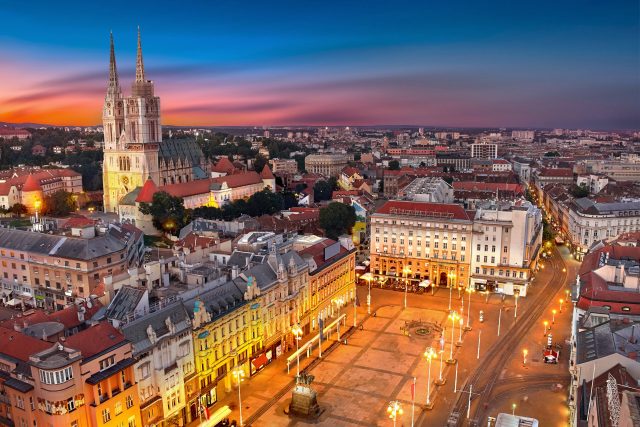
European Diary: Zagreb, April 2024
Zagreb is one of the many picturesque Habsburg cities in Central Europe which display a long and sometimes tortuous, but always interesting, history. I was there two years ago, as I describe here. On 24 April 2024, I found myself again there at a conference held jointly by the Zagreb School of Economics and Management and the Austrian Economics Centre. Since I am a political philosopher by training, I was asked to discuss the morality of the market. I began my talk by pointing out that the case for trade was relatively straighforward and easy. I have an apple while I need an orange. You have an orange while you need an apple. We are both better off if we trade the apple for the orange. We only trade if it is to our mutual benefit. There is no coercion involved. But the case for private property rights seems to be harder. How did I come to have my apple and you your orange in the first place?
Justifications for Private Property Rights
English philosopher John Locke provided an answer in his Second Treatise of Civil Government in 1689. Essentially it was that you could appropriate goods—which meant a right to exclude others from their use—if you did not make others worse off by the appropriation; and you did not necessarily make them worse off because the immense increase in productivity brought about by private property rights did more than make up for the one lost opportunity from your appropriation. Locke’s argument has been refined and strengthened by American philosopher Robert Nozick in his brilliant Anarchy, State, and Utopia. Scottish philosopher David Hume however held that it was not necessary to justify private property rights in the way Locke did. What was only necessary was the absence of legitimate counter-claims. Canadian philosopher Jan Narvesen has plausibly argued much in the same vein.
Both Locke and Hume present convincing arguments for their positions. But leaving alone the problem of initial appropriation, the case for private property rights certainly is strong. Such rights bring both prosperity and peace. They bring prosperity because you look better after what belongs to you than what belongs to others. You will plant apple trees and orange trees in your own garden, but hardly in the commons. Having property rights over goods also enable you to exchange them to the mutual benefit of all. Moreover, such property rights enable you to plan for the future, for example invest in innovations. Secondly, private property rights bring peace because you do not need to quarrel with others about the use of resources. You make decisions about your resources, and others make decisions about their resources. Good fences make good neighbours.
The Argument from Identity
Private property is however only one of the four pillars of free society, with free trade, limited government, and respect for traditions. What is the philosophy of the free society? How can it be justified? In my talk, I pointed out that the two most common justifications of the free society were utilitarianism and natural law. On their own, I think that neither of those two justifications would suffice, although perhaps in combination they could do so, like English philosopher H. L. A. Hart argued in a famous essay, ‘The Minimum Content of Natural Law.’ But there was a third way of approaching the problem, laid out by English philosopher Michael Oakeshott. It is briefly that we need no justification of the free society, because we have over time come to accept and assume a certain identity, that of individuals with the will and ability to choose for themselves. What I have called conservative liberalism can best be described as the self-consciousness of the free society, the articulation of a practice which has become our second nature. The clearest statement of this position is in Oakeshott’s essay, ‘The Masses in Representative Democracy,’ where he also explains the opposition to the free society by the mass men. They are those people who lack the will and ability to make choices for themselves and therefore retreat into groups with predetermined purposes: a mass man enlists in an army, marching along under orders, or he joins an association which makes most or all choices for him. He is afraid of himself as an individual, refuses to be himself.
Oakeshott’s argument from identity can be described in metaphysical terms. Human history is the history of freedom in the sense that Hegel’s World Spirit, Weltgeist, has gradually become self-conscious. First, there was the freedom of one man, the despot, then the freedom of some, the elite, and finally the freedom of all, in a liberal democracy. But the freedom of all requires rules which enable different individuals to live together peacefully, and these rules, Oakeshott says, have to be purposeless although certainly they are not pointless. The law should be an umpire, not a player. It should tell people how to do things, not which things to do. The gradual extension of freedom was the idea American philosopher Francis Fukuyama used when he envisaged ‘the end of history’, where the Western Spirit had become the World Spirit. But Fukuyama’s mistake was to think that all nations were on their way to freedom. Some nations have instead retreated into serfdom, for example the Russians who, with some honourable exceptions, seem to fear freedom. But in principle, Fukuyama is right: Everybody is fit for freedom, although it may take a long time to acquire the will and ability to exercise it.



 Subscribe
Subscribe